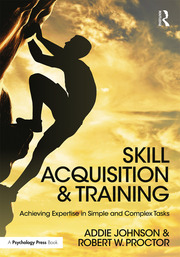542,000+ Visitors Annually!
Menu

Skill Acquisition and Training describes the building blocks of cognitive, motor, and teamwork skills, and the factors to take into account in training them. The basic processes of perception, cognition and action that provide the foundation for understanding skilled performance are discussed in the context of complex task requirements, individual differences, and extreme environmental demands. The role of attention in perceiving, selecting, and becoming aware of information, in learning new information, and in performance is described in the context of specific skills. A theme throughout this book is that much learning is implicit, the types of knowledge and relations that can profitably be learned implicitly and the conditions under which this learning benefits performance are discussed. The question of whether skill acquisition in cognitive domains shares underlying mechanisms with the acquisition of perceptual and motor skills is also addressed with a view to identifying commonalities that allow for widely applicable, general theories of skill acquisition. Because the complexity of real-world environments puts demands on the individual to adapt to new circumstances, the question of how skills research can be applied to organizational training contexts is an important one. To address this, this book dedicates much content to practical applications, covering such issues as how training needs can be captured with task and job analyses and how to maximize training transfer by taking trainee self-efficacy and goal orientation into account. This comprehensive yet readable textbook is optimized for students of cognitive psychology looking to understand the intricacies of skill acquisition.
Johnson, A. & Proctor, R.W. (2017). Skill acquisition and training - Achieving expertise in simple and complex tasks. London: Routledge.
Provincial Land Acknowledgement
Contact North | Contact Nord respectfully acknowledges that our work, and the work of our community partners, takes place on traditional Indigenous territories across the province.
We are grateful to be able to work and live in these territories. We are thankful to the First Nations, Métis and Inuit people who have cared for these territories since time immemorial and who continue to strengthen Ontario and all communities across the province.